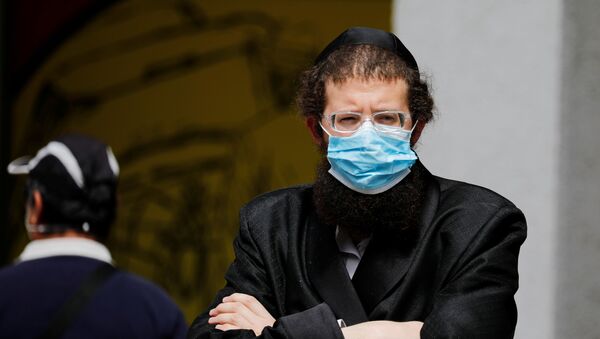Israel's secret intelligence service, the Mossad, has delivered more Coronavirus related equipment to Israel, channel 12 reported.
The new batch included PCR kits that will allow for additional one thousand tests to be performed daily, ventilators, reagents and an HIV medicine that is currently being used as an experimental treatment in patients in difficult conditions.
According to the Health Ministry, the intelligence service is also working on producing 47 different drugs and anesthetics that Israel is currently lacking.
Previously, it has been reported that the organisation had been responsible for the delivery of ten million medical masks and a significant number of ventilators.
Israel Mobilises Its All Forces
Danny Yatom, the man who headed the spy agency in the late nineties, says carrying such operations is one of the organisation's main goals.
"The Mossad is not only responsible for the collection of intelligence and carrying out counter-terrorism missions but it is also responsible for special operations. Pandemic is one of them. Whenever there is a crisis, Israel mobilises all of its national sources, including the IDF and the Mossad".
This is not the first time Israel has utilized its spy agency for civilian purposes. In May 1960, the Mossad that kidnapped a Nazi war criminal, Adolf Eichman, and bringing him to face justice in Israel.
In 1980s the intelligence service embarked on a seven-week clandestine mission to bring more than eight thousand Ethiopian Jews to Israel via Sudan, a country that has been hostile to the Jewish state and that had zero relations with it.
Over the years, the Mossad has been responsible for many such operations helping Jews to smuggle across the border in countries like Syria, Lebanon and Yemen, and Yatom says it is due to the organisation's close relations with other states -- some of which don't have ties with Tel Aviv -- that the spy agency has been chosen to lead this mission too.
"The Mossad has managed to build close relations not only with governments but also with businessmen, officials and politicians. At a time of need, the organisation utilises these connections to beat others in this difficult competition," said the former spy chief.
Indeed, the competition is fierce, with countries struggling to supply the much needed equipment to fight the pandemic. So far, nearly three million people have been infected by the virus worldwide. More than 200 thousand people have died from COVID-19.
Mossad As Super-Hero
The situation in Israel is much better than in many other countries that have been affected by the virus. Up until today, some 200 Israelis have died from the deadly virus. 15 thousand others are still being treated in hospitals across the country.
This is probably due to the fact that the government was quick to introduce strict measures on the early stages of the pandemic that erupted in the Jewish state in the end of February. These included not only the shutting down of businesses, educational institutions and governmental offices but also a total lockdown of full towns and neighbourhoods, should they be considered COVID-19 hubs.
But the relatively 'mild' pandemic hasn't stopped Tel Aviv's fears that the situation might spiral out of control and pushed it to acquire supplies of medical equipment to prevent a situation like in Italy where patients have been reportedly cut off from oxygen due to the lack of breathing machines.
Israel now has more than two thousand ventilators, a lot of which have been bought by the Mossad abroad, turning the agency into a national hero once again.
"We don't do it to upgrade the organization's image. It is rather a byproduct of the agency's actions. This is what brings the Mossad the recognition and this is why people look at us as the world's best spy agency," said Yatom.
Something that cannot be said about Israel's Health Ministry that has been put in charge of managing the crisis.
Although more than 60 percent of Israelis are satisfied with the way Prime Minister Benjamin Netanyahu has been handling the pandemic, only 22 percent of those asked could say the same about the Health Ministry chief Yaakov Litzman, who has already announced his intention to leave the post.
However, Yatom says "it is not the right time to give grades to anyone".
"We are still in the middle of a 'war'. When this mess is over, we will make conclusions, assess our policies and take necessary measures to prevent the mistakes that have been made during this wave of the pandemic from happening again".


